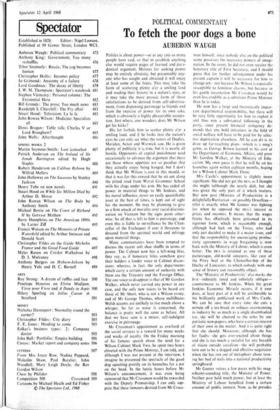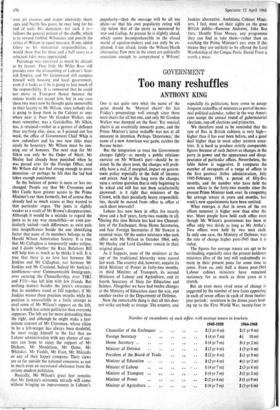To fetch the poor dogs a bone
POLITICAL COMMENTARY AUBERON WAUGH
Politics is about power—or at any rate so many people have said, so that to establish anything else would require pages of learned and para- doxical argument. Motives for seeking power may be entirely altruistic, but presumably any- one who has sought and obtained it will enjoy at least some of the fruits. This may take the form of scattering plenty o'er a smiling land and reading their history in a nation's eyes, or it may take the more prosaic form .of those satisfactions to be derived from self-advertise- ment, from dispensing patronage to friends and from the exercise of power for its own sake, which is obviously a highly pleasurable occupa- tion. Just where, one wonders, does Mr Wilson get his kicks?
His lot forbids him to scatter plenty o'er a smiling land, and if he looks into the nation's eyes he can only see what the voters of Dudley, Meriden, Acton and Warwick saw. He is given plenty of publicity it is true, but it is nearly all hostile. Opponents of capital punishment used occasionally to advance the argument that there are those whose appetites are so peculiar that they actually enjoy being hanged, but I don't think that Mr Wilson :s cast in this mould, or that it was for this reward that he set out along the pitted road from Wirral Grammar School with his clogs under his arm. He has ceded all power in material things to Mr Jenkins, and his moral influence, never an easily quantifiable asset at the best of times, is kept out of sight for the moment. He may be planning to give us a firm smack of morality over racial discrimi- nation on Vietnam but the signs point other- wise. So all that is left to him is patronage, and even this is liable to surveillance by the Chan- cellor of the Exchequer if ever it threatens to descend from the spiritual world and infringe upon material things.
Many commentators have been tempted to discuss the recent soft shoe shuffle in terms of power. The Cabinet now has a left-wing bias, they say, as if honorary titles somehow gave their holders a louder voice in Cabinet discus- sions; whereas, in fact, the only departments which carry a certain amount of authority with them are the Treasury and the Foreign Office. The one voice to disappear is that of Mr Gordon Walker, which never carried any power in any case, and the only new voices to be heard are those of Mr Short, who is not a Wilson crony, and of Mr George Thomas, whose mellifluous Welsh accents are unlikely to rise much above a whisper. So far as noise is concerned, the balance is prelty well the same as before. All that we have seen is a minor, self-indulgent exercise in patronage.
Mr Crossman's appointment as overlord of the social services is a reward for many weeks and weeks of loyalty. On the Friday morning of his famous speech about the need for a Wilson Cabinet Mark Two, he spent two hours closeted With the Prime Minister, I am told, and although I was not present at the interview, I imagine he presented the spectacle of the good dog squatting prettily on its haunches for a pat on the head. In the hectic hours before Mr Wilson's announcement, it was even being rumoured that Mr Crossman would be rewarded with the Deputy Premiership. I can only sup- pOke thal these rumours derived from Mr Cress-
man himself, since nobody else on the political scene possesses the necessary powers of-imagi- nation. In the event, he did not even receive thz honorary title of First Secretary, and I should guess that for further advancement under his present captain it will be necessary for him to change sex—not because Mr Wilson is especially susceptible to feminine charms, but because in his gentle incarnation Mr Croisman would be even less credible as a substitute Prime Minister than he is today.
He now has a large and theoretically impor- tant departmental responsibility, but there will be very little opportunity for him to exploit it and thus win a substantial following in the party, since present financial stringency de- mands that any bold initiatives in the field of social welfare will have to be paid for by selec- tive deprivation elsewhere. All he can do is to draw up far-reaching plans—which is a mug's game, as George Brown learned to his cost at the Department of Economic Affairs, and poor Mr Gordon Walker, at the Ministry of Edu- cation. My own guess is that he will be on his haunches again within eighteen months, baying for a Wilson Cabinet Mark Three.
Mrs Castle's appointment is- slightly more significant. She did not get the DEA, as I thought she might (although she nearly did), but she was given the only part of it which matters. Her new post (Minister of Productivity is a delightfully Ruritarian—or possibly Orwellian:— title) is exactly what Mr Gunter was fighting for when he opposed the DEA'S interest in prices and incomes. It means 'that the wages freeze has effectively been jettisoned in its rigorous form, which is reasonable enough, although bad luck on the Tories, who had only just decided to make it a major issue, and that the responsibility for encouraging produc- tivity agreements in wage bargaining is :now back with the Ministry of Labour, which is.even better. The DEA is retained as one of these picturesque, old-world sinecures, like care of the Privy Seal or the Chancellorship of the Duchy of Lancaster, to which nobody with any sense of history can reasonably object.
The 'Ministry of Productivity' also marks the first—infinitely timid and infinitely oblique— countermove to Mr Jenkins. When the great Jenkins Economic Miracle occurs, if it ever does, at least part of it will be attributable to the brilliantly publicised work of Mrs Castle. We can be sure that every time she outs a minute off a tea-break or reduces overmanning in industry by so much as a single disembodied toe, she will be cheered to the echo by our patriotic newspapers, who have a certain interest of their own in the matter. And it is quite right that she should. Moreover, although she has her faults—she gets over-excited about things and she is too much a socialist for any breadth of vision outside socialism—she will probably turn out to be a dogged and effective negotiator when she has run out of metaphors about turn- ing her bed of nails into a national productivity springboard.
Mr Gunter retires a few paces with his mag- nificent-sounding title, the Minister of Power. Neither post held much power, but at least the Ministry of Labour benefited from a certain amount of public interest. Now, as he presides ' over pit closures and winter electricity short- ages and North Sea gases, he may long for his bed ••of nails. His demotion—for such it is- •• follows the general pattern of the shuffle, which • is- to reward faithful Wilsonites and punish the critics of Wilson in equal measure. If one added Glory to his ministerial responsibilities, it would show that his three and a half years as a reluctant fakir were appreciated.
Patronage was exercised as much by default as' by favour. Thus little Mr Willie Ross still presides over the dismantling of Labour's Scot- tish Empire, and Mr Greenwood still occupies himself with housing and local government, even if it looks as if he is going to lose much of the responsibility. It is rumoured that he could not move to Transport House because the unions would not accept him, but in any case these two must now be thought quite immovable in their loyalty to Mr Wilson, since nobody else is going to keep them in the Cabinet or any- where near it. Poor Mr Gordon Walker, one must remember, was a Gaitskellite. Mr Silkin, too, is retained—rather as a gesture of defiance than anything else, since, as I pointed out last week, the office of Government Chief Whip is now redundant and his two new titles must surely be honorary. Mr Wilson must be run- ning out of honours. The next stop for Mr Silkin can only be the Order of Merit. Mr Healey had already been punished when he was passed over for the Foreign Office, and Mr Wilson did not feel strong enough to press demotion—or perhaps he felt that the lad had taken enough punishment.
So the balance of power is more or less un- changed. People say that Mr Crossman and -Mrs Castle have greater access to the Prime Minister's ear than formerly, but of course they already had as much access as they wanted to that particular organ. The junta is slightly weaker as a result of Mr Brown's disappearance. Although it would be a mistake to regard the junta as in any way monolithic—or even par- ticularly united—such differences as exist pale into insignificance beside the one identifying factor that none of its members belongs to the Harold Wilson Admiration Society. It is true that Mr Callaghan is temporarily under eclipse, and I doubt whether the Race Relations Bill will help him as much as he thinks it will. It is true that there is no love lost between Mr Jenkins and Mr Callaghan, nor between Mr Jenkins and Mr Crosland. Indeed Mr Jenkins's -nimbleness—over Commonwealth Immigrants, over securing the Chancellorship, over TSR2 and Fl 1 1—has left him with few friends. But nothing matters besides the junta's awareness that its members stand or fall together; if Mr Jenkins wastes these precious months while his position is unassailable in a futile attempt to ••steal some of Mr Wilson's support on the left, he is a much less astute politician than everyone supposes. The left are far more demanding than the right, and although he might make a last- minute convert of Mr Crossman, whose craim to be a left-winger has always been doubtful, 'he must resign himself to the fact that no Labour administration with any chance of suc- cess can hope to enjoy the support of Mr Dickens, Mr Mendelson, Mr Orrne, Mr Whitaker, Mr Faulds, Mr Foot, Mr Mikardo or any of their happy company. Their views are so far outside the national consensus as not to merit even an occasional obeisance from the serious modern politician.
Basically, Mr Wilson's great fear remains that Mr Jenkins's economic miracle will come without bringing an improvement in Labour's popularity—then the message will be all too plain—or that his own popularity rating will slip' below that of the party •as measured' 'by NOP and Gallup. At present he is slightly ahead, which seems incomprehensible to the •closed world of opinion-makers and can only be ex- plained, I •am afraid, inside the Wilson/Heath alternative: Few men in the street are politically conscious enough to comprehend a Wilson/ Jenkins alternative. Ambitious Cabinet Minis- ters, I feel, must set their sights on the great . public—Eamonn Andrews, Juke Box Jury, -Double Your Money, any programme 'they 'can find to take them—rather than on catching -the Prime Minister's ear; even if this -.means they are unlikely 'to be offered the Lord Wardenship of the Cinque Ports. David Frost is -worth a mass.











































 Previous page
Previous page